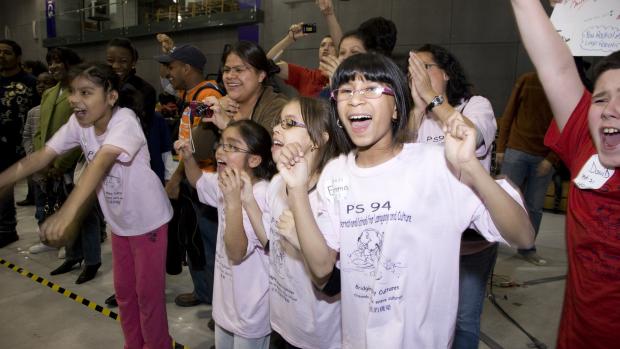Cooking Up Victories: FIRST LEGO League Competition at NYU-Polytechnic

Small knots of children knelt on the floor beside LEGO-built robots, as a pre-teen dressed as a chef led a handful of similarly outfitted classmates — oversized toques and all — through the cafeteria of the Polytechnic Institute of New York University (NYU-Poly) earlier this month. Others gathered at tables to huddle with their coaches at the FIRST LEGO League (FLL) competition, which poses real-world engineering problems that students attempt to solve using robots. This year, for instance, participants were asked to look at food safety (hence, the playful chef costumes), while past themes have addressed transportation, solar energy, even a mission to Mars.
"It's much more than I expected," said Doreen May, one of the many parents along the sidelines watching the busy crowds of kids, addressing not the competition’s theme, but its size and breadth.
Bigger and Better
It has been more than 20 years since inventor Dean Kamen founded FIRST, and the nonprofit now guides 17,000 teams worldwide through competitions meant to nurture a love of the STEM (science, technology, engineering, mathematics) disciplines among elementary and secondary school students. Despite its reach and influence, the FLL has just 16 paid staff members, said Lee Doucette, who manages partner services for the northeast region of FLL. In-kind donations, volunteers and partners like NYU-Poly — FIRST's only affiliate in New York City — fill in the rest.
"Partnerships with organizations like NYU-Poly are crucial," said Doucette.
Architect of that partnership is Ben Esner, director of the Center for K-12 STEM Education at NYU-Poly, who Doucette described simply as "awesome." He's intent on deepening the Institute's relationship with FIRST, certain that a stronger partnership will benefit students and teachers alike.
"We want to extend our work together and create a series of courses that will help teachers and coaches effectively use robotics in classrooms and in after-school settings to advance student learning," Esner said. "These are powerful teaching tools that demonstrate a range of fundamental STEM concepts across a range of disciplines."
Today, in partnership with Vikram Kapila, the principle investigator on Applying Mechatronics to Promote Science (AMPS) and Central Brooklyn STEM Initiative (CBSI), the center places NYU-Poly graduate student mentors at select schools in Brooklyn through its AMPS and CBSI programs. Esner wants to extend their influence through what he calls “mobile squads”: teams of mentors that could assist with FIRST education in classrooms throughout New York City.
LEGO: The Building Blocks of Education
Esner believes the FLL competition is especially well suited for STEM education. “There’s a great deal of familiarity with LEGOs among young people and adults,” he said. “People think it’s cool. It’s very accessible.”
The seemingly ubiquitous colorful blocks — found in the play areas of dentists’ offices, kids’ bedrooms and toy stores — have been around since the 1930s, so parents, grandparents, teachers and mentors are as familiar with them as kids are today. That fact, together with FLL’s low registration fees, produces a vibrant, dynamic program, believes Esner.
“If there’s one consensus on education these days, it’s that STEM should be taught in engaging and activity-based ways,” he said. “It may be the only thing educators agree on.”
A Continuing Evolution
Educators at the FLL competition agreed on one other point: The location of the event made a difference. Said Jasmin Hume, a second-year doctoral candidate in NYU-Poly’s materials chemistry program, “Having the competition at [the Institute] can be very inspiring. The kids are here with people who are getting degrees in these disciplines, and they see the neat things we’re doing. It’s opening them up to a whole different path.”
Noam Pillscher, an instructor at the Urban Assembly Institute for Young Women, thought the college setting was also good for teachers. “We’re preparing our kids to be college-ready, but if my notion of college-ready is not what colleges are now expecting…” he said, shaking his head.
His colleague Mike Somersel nodded in agreement and said, “Technology doesn’t stop evolving. We expect doctors to be up on new practices, so why shouldn’t teachers be involved and up on the new teaching methods?”
Participation in the SMART program at NYU-Poly last summer allowed Pillscher to learn about mechatronics and microcontrollers, lessons that helped him guide his students’ submission to the FLL competition: an application that monitors garden conditions, such as soil temperature, to assist growers in the food cycle. His team went on to take first place in the project research category of the competition and so will go on to compete in the citywide finals at the Jacob K. Javits Center in Manhattan in March. (A complete list of winners is available here.)
“This competition really makes our kids grow as students,” smiled Pillscher, “and as young scientists.”




